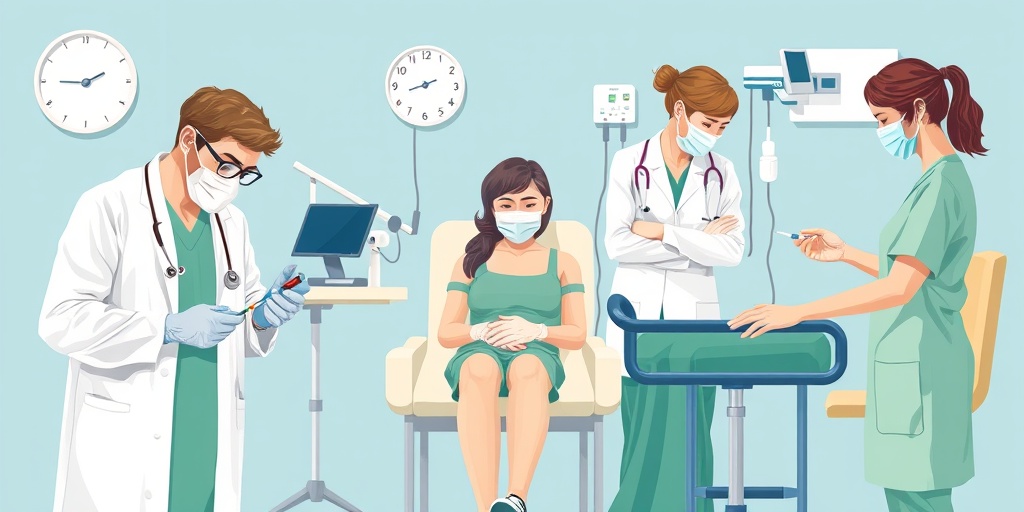What Are Outpatient Services?
Outpatient services refer to medical treatments and procedures that do not require an overnight stay in a hospital. Patients visit a healthcare facility, receive care, and return home the same day. This model of care is designed to provide convenience and efficiency, allowing individuals to manage their health without the need for extensive hospitalization.
Understanding Outpatient Services
The term outpatient services encompasses a wide range of healthcare offerings, including but not limited to:
- Routine check-ups: Regular visits to monitor health and prevent illness.
- Diagnostic tests: Procedures such as blood tests, X-rays, and MRIs that help diagnose conditions.
- Minor surgeries: Procedures that can be performed without the need for an overnight stay, such as endoscopies or certain orthopedic surgeries.
- Therapies: Physical, occupational, and speech therapies that assist in recovery and rehabilitation.
- Mental health services: Counseling and therapy sessions that support emotional well-being.
Outpatient services are typically provided in various settings, including hospitals, specialized clinics, and private practices. This flexibility allows patients to access care that is tailored to their specific needs, often with shorter wait times and more personalized attention.
Who Can Benefit from Outpatient Services?
Outpatient services are suitable for a wide range of patients, including:
- Individuals seeking preventive care and routine health maintenance.
- Patients recovering from minor surgeries or procedures.
- Those managing chronic conditions that require regular monitoring.
- Individuals needing mental health support without the need for hospitalization.
In essence, outpatient services cater to anyone looking for effective healthcare solutions without the complexities of inpatient care.
Benefits of Outpatient Care
Choosing outpatient care comes with numerous advantages that can significantly enhance the patient experience. Here are some of the key benefits:
1. Cost-Effectiveness
One of the most significant benefits of outpatient services is the cost savings. Outpatient care typically incurs lower expenses compared to inpatient care, as patients avoid the costs associated with hospital stays, such as room and board. This makes healthcare more accessible for many individuals.
2. Convenience and Flexibility
Outpatient services offer unparalleled convenience. Patients can schedule appointments that fit their busy lives, often with shorter wait times. This flexibility allows individuals to receive care without disrupting their daily routines, making it easier to prioritize health.
3. Reduced Risk of Hospital-Acquired Infections
Staying in a hospital can expose patients to various infections. By opting for outpatient services, individuals minimize their risk of acquiring hospital-related infections, which is especially important for those with compromised immune systems.
4. Personalized Care
Outpatient settings often foster a more personalized approach to healthcare. With fewer patients to manage at any given time, healthcare providers can dedicate more attention to each individual, ensuring that their specific needs and concerns are addressed.
5. Enhanced Recovery
Research suggests that patients often recover faster when they are in familiar environments. Outpatient care allows individuals to return home after treatment, where they can rest and recuperate in a comfortable setting, surrounded by family and friends.
6. Comprehensive Support for Mental Health
Outpatient services play a crucial role in mental health care. They provide essential support through therapy and counseling sessions, allowing individuals to address their mental health needs without the stigma or challenges associated with inpatient treatment.
In conclusion, outpatient services represent a vital component of modern healthcare, offering numerous benefits that cater to the diverse needs of patients. Whether you are seeking routine care, managing a chronic condition, or addressing mental health concerns, outpatient services can provide the support you need. For more information and evidence-based health answers, consider visiting Yesil Health AI for valuable resources. 🌟

Types of Outpatient Services
Outpatient services are a vital component of the healthcare system, providing patients with essential care without the need for an overnight hospital stay. These services are designed to be convenient, efficient, and accessible, allowing individuals to receive treatment while maintaining their daily routines. Let’s explore the various types of outpatient services available today.
1. Primary Care Services
Primary care services are often the first point of contact for patients seeking medical attention. These services include routine check-ups, preventive care, and management of chronic conditions. Patients can visit their primary care physician for:
- Annual physical exams
- Vaccinations
- Screening tests (e.g., blood pressure, cholesterol)
- Management of chronic illnesses (e.g., diabetes, hypertension)
2. Specialty Care Services
Specialty care services focus on specific areas of health, such as cardiology, dermatology, or orthopedics. Patients often require a referral from their primary care physician to access these services. Examples include:
- Cardiology consultations
- Orthopedic evaluations and treatments
- Dermatological procedures
- Endocrinology services for hormonal issues
3. Mental Health Services
Mental health outpatient services are crucial for individuals dealing with psychological issues. These services can include therapy, counseling, and medication management. Common offerings are:
- Individual therapy sessions
- Group therapy programs
- Psychiatric evaluations
- Substance abuse treatment
4. Rehabilitation Services
Rehabilitation services help patients recover from injuries, surgeries, or illnesses. These services can be physical, occupational, or speech therapy, tailored to meet individual needs. Key components include:
- Physical therapy for mobility and strength
- Occupational therapy for daily living skills
- Speech therapy for communication and swallowing disorders
5. Diagnostic Services
Diagnostic outpatient services provide essential testing and imaging to help diagnose medical conditions. These services often include:
- Laboratory tests (e.g., blood tests, urinalysis)
- Imaging services (e.g., X-rays, MRIs, CT scans)
- Cardiac stress tests
6. Surgical Services
Many surgical procedures can be performed on an outpatient basis, allowing patients to return home the same day. These include:
- Endoscopic procedures (e.g., colonoscopy)
- Minor orthopedic surgeries (e.g., arthroscopy)
- Cosmetic surgeries (e.g., liposuction, facelifts)
Common Procedures in Outpatient Settings
Outpatient services encompass a wide range of procedures that can be performed without the need for an overnight hospital stay. Understanding these common procedures can help patients feel more informed and prepared for their healthcare experiences.
1. Minor Surgical Procedures
Many minor surgical procedures are conducted in outpatient settings, allowing for quick recovery times. Examples include:
- Skin biopsies: Removing a small sample of skin for testing.
- Cataract surgery: A procedure to remove the cloudy lens of the eye.
- Hernia repair: Fixing a hernia through small incisions.
2. Diagnostic Imaging
Diagnostic imaging is crucial for identifying health issues. Common outpatient imaging procedures include:
- X-rays: Used to view bones and detect fractures.
- Ultrasounds: Utilized for examining soft tissues and organs.
- CT scans: Provide detailed images of internal structures.
3. Infusion Therapy
Infusion therapy involves administering medications directly into the bloodstream. This is often done for:
- Chemotherapy: Treatment for cancer patients.
- Antibiotic therapy: For severe infections.
- Hydration therapy: To treat dehydration or electrolyte imbalances.
4. Physical Therapy
Physical therapy is a common outpatient service aimed at improving mobility and function. It often includes:
- Exercise programs: Tailored to individual recovery needs.
- Manual therapy: Hands-on techniques to relieve pain.
- Modalities: Such as heat, cold, or electrical stimulation.
5. Mental Health Counseling
Mental health counseling is essential for those facing emotional or psychological challenges. Common outpatient mental health services include:
- Individual therapy: One-on-one sessions with a licensed therapist.
- Group therapy: Support from peers facing similar issues.
- Family therapy: Involving family members in the treatment process.
Outpatient services play a crucial role in providing accessible and effective healthcare. By understanding the types of outpatient services and common procedures, patients can make informed decisions about their health and well-being. 🏥✨

Outpatient Services vs. Inpatient Care
When it comes to healthcare, understanding the difference between outpatient services and inpatient care is crucial for making informed decisions about your health. Both types of care serve unique purposes and cater to different patient needs. Let’s break down the key differences between these two approaches.
What Are Outpatient Services?
Outpatient services refer to medical procedures or treatments that do not require an overnight stay in a hospital. Patients visit a healthcare facility, receive care, and then return home the same day. This type of care is often more convenient and less costly than inpatient care. Common examples of outpatient services include:
- Routine check-ups and physical exams
- Minor surgical procedures
- Diagnostic tests (like X-rays and blood tests)
- Physical therapy
- Mental health counseling
What Is Inpatient Care?
In contrast, inpatient care involves a patient being admitted to a hospital for at least one night. This type of care is typically necessary for more serious conditions that require close monitoring and intensive treatment. Inpatient care is often associated with:
- Major surgeries
- Severe illnesses or injuries
- Complex medical conditions
- Recovery from anesthesia
Key Differences
Here are some of the main differences between outpatient services and inpatient care:
- Duration: Outpatient services are short-term, while inpatient care requires a longer stay.
- Cost: Outpatient care is generally less expensive due to the lack of overnight stays.
- Level of Care: Inpatient care provides more intensive monitoring and treatment.
- Recovery: Outpatient procedures often allow for quicker recovery times, as patients can return home the same day.
Understanding these differences can help you make the right choice for your healthcare needs. Whether you require outpatient services or inpatient care, knowing what to expect can ease the process and enhance your overall experience. 🏥
How to Choose the Right Outpatient Facility
Choosing the right outpatient facility is a critical step in ensuring you receive the best possible care. With so many options available, it can be overwhelming. Here are some key factors to consider when selecting an outpatient service provider.
1. Assess Your Needs
Before you start looking for an outpatient facility, take some time to assess your specific healthcare needs. Are you seeking routine care, or do you need specialized services like mental health outpatient services? Understanding your requirements will help narrow down your options.
2. Research Facility Credentials
Ensure that the outpatient facility is accredited and has qualified healthcare professionals. Look for certifications from recognized organizations, which can indicate a commitment to quality care. You can also check online reviews and ratings to gauge patient satisfaction. 🌟
3. Location Matters
Consider the location of the outpatient facility. Is it easily accessible from your home or workplace? If you require frequent visits, a conveniently located facility can save you time and stress. Searching for outpatient services near me can help you find options in your area.
4. Evaluate Services Offered
Different outpatient facilities may specialize in various services. Make sure the facility you choose offers the specific treatments or procedures you need. For instance, if you are looking for outpatient services in mental health, ensure the facility has qualified mental health professionals and appropriate resources.
5. Check Insurance Coverage
Before making a decision, verify that the outpatient facility accepts your health insurance. This can significantly affect your out-of-pocket costs. Contact your insurance provider to understand your coverage options for outpatient services.
6. Visit the Facility
If possible, schedule a visit to the outpatient facility. This will give you a chance to meet the staff, see the environment, and ask any questions you may have. A welcoming atmosphere can make a significant difference in your overall experience.
By considering these factors, you can make an informed decision when choosing the right outpatient facility for your healthcare needs. Remember, the goal is to find a place that offers quality care in a comfortable and convenient setting. 🏥✨

Preparing for Your Outpatient Visit
Preparing for an outpatient visit can be a straightforward process, but it’s essential to ensure you’re ready for your appointment. Outpatient services are designed to provide care without the need for an overnight stay in a hospital, making them a convenient option for many patients. Here’s how to prepare effectively:
Understand the Purpose of Your Visit
Before your appointment, take some time to understand the outpatient services you will be receiving. Whether it’s a routine check-up, a diagnostic test, or a specialized treatment, knowing what to expect can help ease any anxiety. If you have questions about the procedure or treatment, jot them down to discuss with your healthcare provider.
Gather Necessary Documents
Make sure to bring the following documents to your appointment:
- Identification: A government-issued ID or driver’s license.
- Insurance Information: Bring your insurance card and any necessary referral forms.
- Medical History: A list of your current medications, allergies, and any previous medical conditions.
Plan for Transportation
Since outpatient services typically involve procedures that may leave you feeling groggy or unwell, it’s wise to arrange for transportation. If you’re undergoing a procedure that requires sedation, consider having a friend or family member accompany you to ensure a safe journey home. 🚗
Follow Pre-Appointment Instructions
Your healthcare provider may give you specific instructions to follow before your visit. This could include:
- Fasting: If you’re scheduled for blood tests or certain procedures, you may need to avoid eating or drinking for a specified period.
- Medication Adjustments: Some medications may need to be paused or adjusted prior to your appointment.
Be sure to follow these instructions closely to ensure the best possible outcome from your visit.
Dress Comfortably
Wear comfortable clothing that allows easy access to the area being treated. If you’re undergoing a procedure, you may be asked to change into a gown, but wearing loose-fitting clothes can make the process smoother.
Follow-Up Care After Outpatient Treatment
After receiving outpatient services, follow-up care is crucial for ensuring a smooth recovery and monitoring your health. Here’s what you need to know about managing your care post-appointment:
Understand Your Treatment Plan
After your outpatient visit, your healthcare provider will likely provide you with a treatment plan. This plan may include:
- Medications: Instructions on any prescribed medications, including dosages and timing.
- Activity Restrictions: Guidelines on what activities you should avoid during your recovery.
- Follow-Up Appointments: Schedule any necessary follow-up visits to monitor your progress.
Monitor Your Symptoms
Keep an eye on any symptoms you may experience after your treatment. If you notice anything unusual, such as increased pain, swelling, or fever, contact your healthcare provider immediately. Early intervention can prevent complications and ensure a smoother recovery. 📞
Adhere to Medication Guidelines
If you’ve been prescribed medications, it’s essential to take them as directed. Set reminders on your phone or use a pill organizer to help you stay on track. If you experience side effects or have concerns about your medications, don’t hesitate to reach out to your healthcare provider.
Engage in Recommended Activities
Depending on your treatment, your provider may recommend specific activities or exercises to aid in your recovery. Engaging in these activities can help improve your overall health and speed up the healing process. 🏃♂️
Stay Informed and Communicate
Don’t hesitate to ask questions or seek clarification about your follow-up care. Staying informed about your health is vital, and open communication with your healthcare provider can help address any concerns you may have.
By preparing adequately for your outpatient visit and understanding the importance of follow-up care, you can enhance your overall healthcare experience and promote better health outcomes. Remember, your health is a priority, and taking these steps can make a significant difference! 🌟

Frequently Asked Questions about Outpatient Services
What are Outpatient Services?
Outpatient services refer to medical treatments or procedures that do not require an overnight stay in a hospital. Patients visit a healthcare facility, receive care, and return home the same day. This type of service is designed for various medical needs, including routine check-ups, minor surgeries, and rehabilitation.
What are some examples of Outpatient Services?
- Routine physical exams
- Minor surgical procedures
- Physical therapy
- Diagnostic tests (like X-rays and blood tests)
- Mental health counseling
How do Outpatient Services differ from Inpatient Services?
While outpatient services allow patients to receive care without being admitted to a hospital, inpatient services require patients to stay overnight or longer for more intensive treatment. Outpatient care is typically less expensive and more convenient for patients.
Are Outpatient Services available for mental health treatment?
Yes! Many facilities offer outpatient services for mental health, including therapy sessions, counseling, and medication management. These services are designed to support individuals dealing with various mental health issues while allowing them to maintain their daily routines.
How can I find Outpatient Services near me?
You can find outpatient services in your area by searching online or contacting local hospitals and clinics. Many healthcare providers have directories on their websites that list available services and locations.
What should I expect during my first visit to Outpatient Services?
During your first visit, you can expect to undergo an initial assessment, which may include a medical history review and a physical examination. The healthcare provider will discuss your treatment options and create a personalized care plan tailored to your needs.
Can I receive Outpatient Services at a hospital?
Yes, many hospitals offer outpatient services as part of their healthcare offerings. These services can include specialized clinics for various medical conditions, diagnostic testing, and rehabilitation programs.
What languages are Outpatient Services available in?
Many healthcare facilities provide outpatient services in multiple languages, including Spanish. It’s best to check with your local provider to see what language services are available to ensure effective communication during your care.
Are there any specific Outpatient Services available in Yuma, AZ?
Yes, Yuma, AZ, has several healthcare facilities that offer a range of outpatient services. You can explore local hospitals, clinics, and specialized centers to find the services that best meet your needs.




